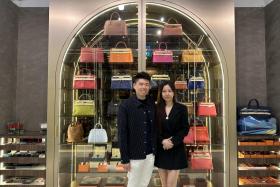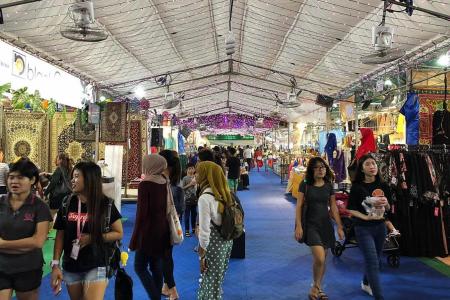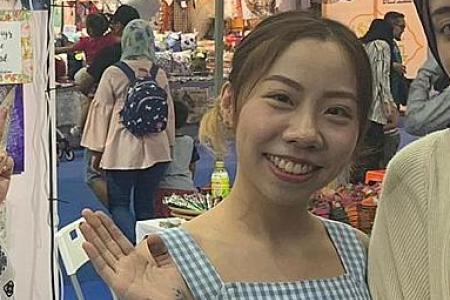Geylang Serai Bazaar: Tradition That Keeps Up With The Times
Tradition plays bigger part this year, while some stall owners combine heritage with modernity
The Geylang Serai Bazaar is back, awash with a colourful mix of Malay-Muslim tradition and contemporary food and lifestyle items.
For Mrs Lydia Matin, 26, and her husband, Mr Daniel Akil Matin, 36, tradition and modernity do not have to be separate.
Running the store Lydia Matin Apparels & Cosmetics at Marsiling Mall, the two have taken their business to the bazaar for the first time this year.
The bazaar, chockful with stalls like theirs selling the traditional baju melayu for men and the baju kurung for women, has proved a successful venture for the couple thus far.
"We are combining traditional cuttings with modern designs," said Mr Matin, who designs the clothes.
"Floral patterns and bright colours for men's clothes are things that you won't see in traditional styles."
Following controversy last year regarding the takeover of novelty or "hipster" food, the bazaar returns this year with a deliberate attempt to retain the nostalgia of Malay tradition.
Just across the Matins' stall is Baju Melayu Klasik, run by two sisters - Madam Ros, 60, and Madam Faridah, 58.
The two are no stranger to the bazaar, having sold traditional Malay clothing - since 2006 - only when the event comes around.
Said Madam Ros: "This year's bazaar is much better than previous years, with better lights and carpeting. They play the azaan (call to worship) and have places to makan. The organisers are Muslim, and they know what Muslims want."
500 STALLS
Boasting around 500 stalls split between selling food and lifestyle items, the brightly lit marketplace features better walkways and ventilation compared with previous years.
According to main organiser Wisma Geylang Serai, food stalls are offering 60 per cent traditional food, while non-food stalls are selling 80 per cent traditional items.
This came following feedback from visitors that last year's bazaar featured too many stalls selling hipster food and not enough traditional food.
But with many stalls like the Matins' - owned by people determined to prove that contemporary and traditional do not have to clash - this year's bazaar seems to have played its cards to perfection.
Said Mr Matin: "There is definitely a demand for these modern designs. We are already selling out."
This year’s bazaar ‘better caters to visitors’ wants'
Miss Ummi Umaira Rahman, 20, has visited the bazaar every year with family and friends to enjoy the food and buy new clothes for Hari Raya.
And each time, she looks forward to the "malam raya lelong", which is when vendors lower the price of their items on the eve of Hari Raya for a last chance to sell out their goods.
Miss Ummi Umaira was one of many patrons who disliked last year's excess of hipster food and considers this year's proportion of non-traditional food an improvement.
She told The New Paper: "There are still many hipster food stalls but most of them sell modern takes on traditional cuisine. That and having bubble tea and other fusion food in the mix better caters to the wants of everyone in the community.
"The bazaar this year shows us all that the organisers have put in more effort to create a better event."
Her views were echoed by stall vendors and customers alike.
RESTING AREAS
A couple, Mr Geronimo Portea, 21, and Miss Jolyna Johari, 23, noted the expanded walkways, better organised stalls and resting areas with sinks as improvements.
This is Mr Portea's second year visiting the bazaar and the fifth consecutive year for Miss Johari.
Mr Portea, however, noted some inconsistencies with the food, saying: "Everything looks good but the taste sometimes doesn't live up to expectations - like the takoyaki from Loco Loco, which just tasted like flour.
"The generic taste of some of the food really doesn't warrant their high prices."
In the first of its four-week run, the bazaar is still not as crowded as it usually gets in the last two weeks of Ramadan, when the rush to prepare for Hari Raya begins.
Said Miss Ummi Umaira: "You wouldn't feel the same way walking in Orchard or Bugis during fasting month as Geylang gives a whole different kind of experience to make us realise why we are fasting in the first place." - ERLINA CALUBAYAN
FYI
WHAT Geylang Serai Bazaar
TIME 4pm to midnight
DATE Now to June 5
VENUE 1 Geylang Serai
Fusion food still a hit at fair
Local comedian and activist Hirzi Zulkiflie has also given the Geylang Serai Bazaar 2019 his seal of approval. He is the ambassador of new prata-waffles fusion stall Praffles, owned by Fooditude.
The 29-year-old said: "What we are trying to do with Praffles is to create an iconic, signature Singapore menu that fuses traditional Singapore cuisine like chilli crab with a modern flair because the visitors are increasingly non-Malay and non-Muslims.
"It is a nice way to unify the crowd with something that is international enough yet at the same time Singaporean."
He was at the bazaar on Thursday last week, distributing praffles and mingling with the enthusiastic line of customers that snaked around the stall.
Mr Rishi Kesan, 33, co-owner of Meatballs In A Bucket and artisanal beverage stall Sofnade, shared similar sentiments, telling The New Paper that people of his age group - 20s to 30s - feel that hipster cuisine is normal food.
Said Mr Rishi: "In the future, what we consider hipster now will be considered common, and new varieties of novelty food will emerge."
Fashion and food are not the only things experiencing a fusion of tradition and modernity at the bazaar.
The Wendy Peaches Henna stall provides henna services that appeal to all customers, from traditional henna art to adorable animal designs for children and more sophisticated designs for young adults.
Along with her team of artists, owner Wendy Yeo, 27, hopes to make henna more accessible and affordable.
Set up right by the Wendy Peaches is everyone's favourite pop-up carnival, Uncle Ringo, featuring an array of children's amusement rides including the spinning tea cups, carousel, pirate ship and choo choo train. - ERLINA CALUBAYAN
Get The New Paper on your phone with the free TNP app. Download from the Apple App Store or Google Play Store now







